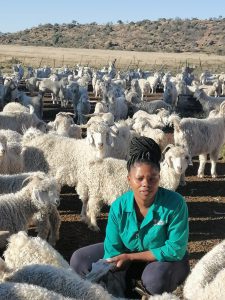Quality wool does the talking for female farmer
In a male-dominated industry where beginners and women are said to be overlooked, forcing them to double their efforts to be recognised, Dintle Maphala lets the quality of her wool speak for itself. Maphala, a 28-year-old farmer in Aliwal North, is one of the farmers capacitated by the department of rural development and agrarian reform (DRDAR).
Through the DRDAR’s livestock improvement scheme — a programme that invests in farmers through the provision of livestock of superior genes — Maphala recently received 28 angora ewes and two angora buck s. The department’s assistance has enabled the passionate young female farmer to produce mohair from her herd of 302 goats. Some of her herd are a mixed breed of angora and boer goats. While these goats give her large volumes, it is of an inferior quality.
“During shearing seasons I’d sell big bales but the money I’d get didn’t correspond with the amount of fur I had produced, and this was all because of the quality,” Maphala said.
She said her herd was slowly improving with the addition of pure angoras — a breed known for its pricey and quality wool. With training on wool production by Mohair SA and the assistance of the DRDAR, Maphala, who holds a farming management qualification, said it was now up to her to su cceed.
She shears twice a year and in the past year made a total of R200, 000 from sales. Now she is aiming for the stars.
“All the recent developments on my farm have nudged me only inches away from my dream. The DRDAR has given me the necessary support and Mohair SA taught me the ropes on wool production and even helped me with the market. Everything is just flowing now,” she said.
The DRDAR has also invested in the fencing of Maphala’s farm and met her primary wool production needs through the provision of a shearing shed with all its accessories, starting with a baling machine, sorter and compressor. Describing government support as a springboard for her business, Maphala said government investment would assist her in overcoming some of the challenges she had been dealing with.
“As a young farmer, especially a woman, I have always had to work even harder and double my efforts to be recognised in the industry, whereas it’s not the case with my male counterparts. But from now on the quality of my wool will do the talking and open more doors for the business,” sh e said.
On her 287ha Goedehoop farm, which she received from her parents in 2016, she also farms cattle, poultry and vegetables. In 2020, she was chosen to undergo poultry production training at the Tsolo Agriculture and Rural Development Institute (Tardi) — an initiative of the Office of the Premier. A poultry production facility is being constructed on her farm, courtesy of the highest office in the province.
“As I am part of the YARD programme of the Eastern Cape province, there’s is no stone I will leave unturned to access opportunities so I can grow in agriculture and encourage entrepreneurship for black people, especially youth and females,” Maphala said.
“I’m planning to be one of the ambassadors in making sure that the youth sees agriculture as a career and a sector that has potential to create employment and feed the nation.” On her farm, she has two permanent employees and 18 temporary workers who she employs during periods of shearing and vaccination.


